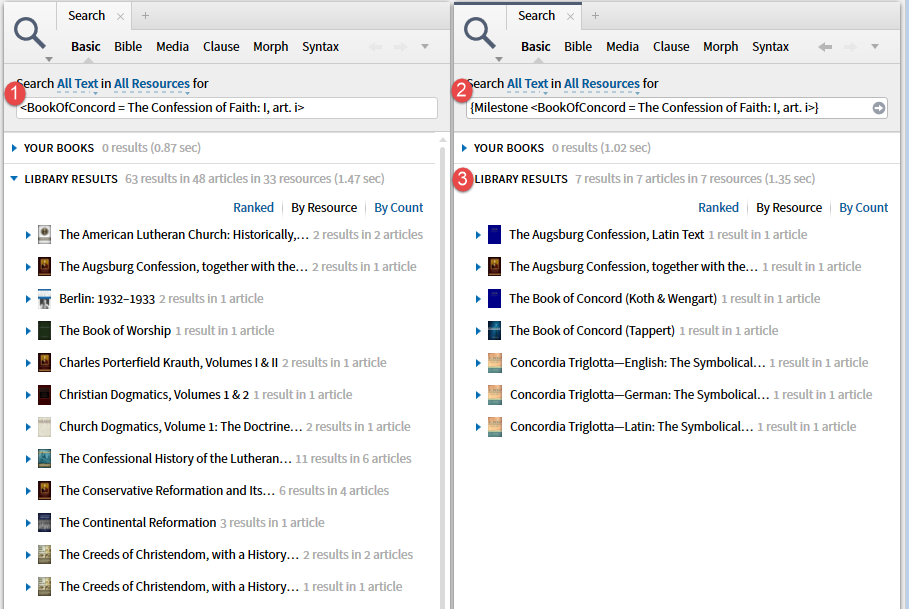This is a reworking of the first tip of the day post which I have also put in a PB format on my machine. I will share the PB on a regular basis. Corrections, additions and some comments will be used to amend the post in PB format.
Tip of the day: How to select which resource to open in, for example, the Ancient Literature section[1]
Generic features --> Data type
Toolbar --> Menus --> Guides --> Passage Guide --> Ancient Literature section
Toolbar --> Menus --> Guides --> Passage Guide --> Liturgy section
Command Box --> Resource Panel --> Context Menu --> Search
When the Ancient Literature section references a work, you may have a specific version you wish to open. You can control this without knowing the system default prioritization nor your own prioritization within the limit of five versions of the work.
- Right click on the reference to bring up the context menu.
- Select the data type option on right-hand side (the < > icon)
- On the left-hand side of the context menu (after the Search section) you will find a list of resources (up to five) you own that contain the resource. Click on the one you want to open it.

Note that the resources and sequence are based upon the priority list for the data type. This technique works any time that a data type appears in the Context Menu. This allows the same technique to be used on data types other than books e.g. the liturgical date.
Using the Liturgy Section as an example, right clicking on the item does not bring up a Context Menu with a data type entry. However, you may use the link to open the resource and select the liturgical date in the resource itself. This does provide the data type.

Once you have selected “First Sunday of Advent Year A”, right click as before.

However, note that “Advent 1 Sunday A” does not have < > in front of it so the Context Menu is picking up references to the data type not instances (milestones) of the data type. In addition to the < > clue, on mouse over the item selected on the right-hand side of the Context Menu is labeled “reference” whereas when it is a data type milestone you have both < > and on mouse over the data type name.
So does one find all occurrences of the text when one may have more than 5? One must use the Milestone search syntax. As described by Bradley Grainger[2]:
[quote]What is it?
"Milestones" are how Logos resources are organized; if you type a reference into the reference box (at the top-left of a resource panel), you're navigating to that milestone within the resource. Logos 6 introduces "{Milestone <Reference>}" search syntax to find these milestones in search results.
How does it work?
While <John 3:16> finds all references to John 3:16, {Milestone <John 3:16>} finds all instances of John 3:16; these could be that verse in a Bible, or a discussion of that verse in a commentary. (This search basically returns the same results as the Commentaries section in the Passage Guide.)
You can use any reference supported by the resources in your library; for example, {Milestone <ApostolicFathers I Clement 1>} finds all texts that include 1 Clem 1.
For an example, I’ll use The Book of Concord The Augsburg Confession article one. To get the appropriate data type reference, I do the following:
- Open a copy of the Book of Concord and navigate to my chosen passage.
- Select a bit of the passage, right click to open the Context Menu, then select the reference AC:1, art. i. Note this is a reference as it lacks < >.
- Note that there are multiple references
- Select an “all resources” search on the reference.

This provides the reference search on the left. By wrapping the reference in the Milestone tags {Milestone <reference>}, I convert the search to one looking for instances rather than references. It finds 7 in my library – more than would show in the Context Menu.

Points to remember:
- The Context Menu will give you the top 5 resources based on prioritization.
- Milestones give you occurrences of the text.
- References give you mentions of the text.
- On mouse over, the right-hand column of the Context Menu names its entries in light text on the right margin.
[1] Original post https://community.logos.com/forums/p/105870/733050.aspx#733050
[2] http://community.logos.com/forums/t/92761.aspx